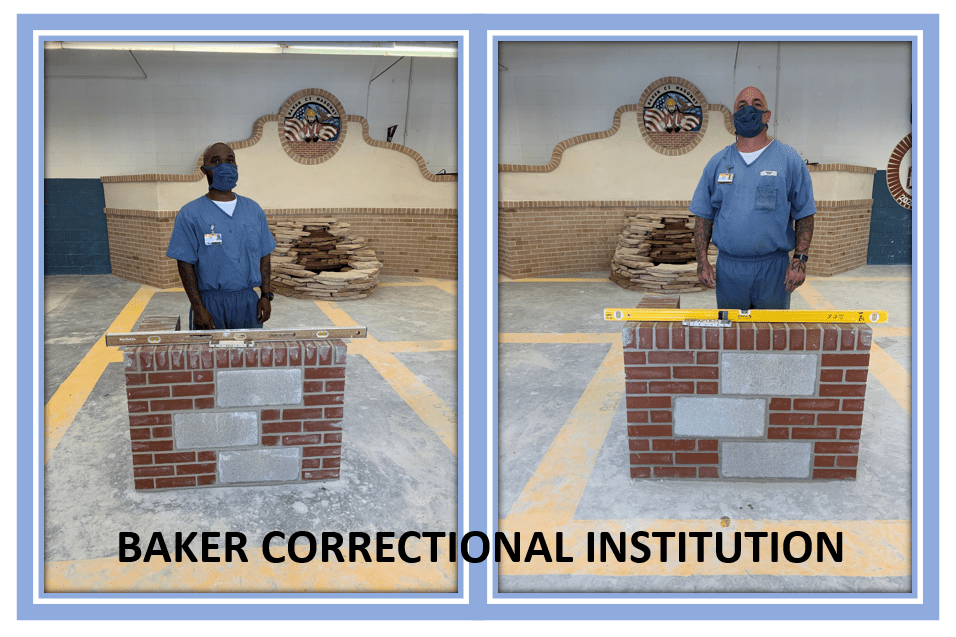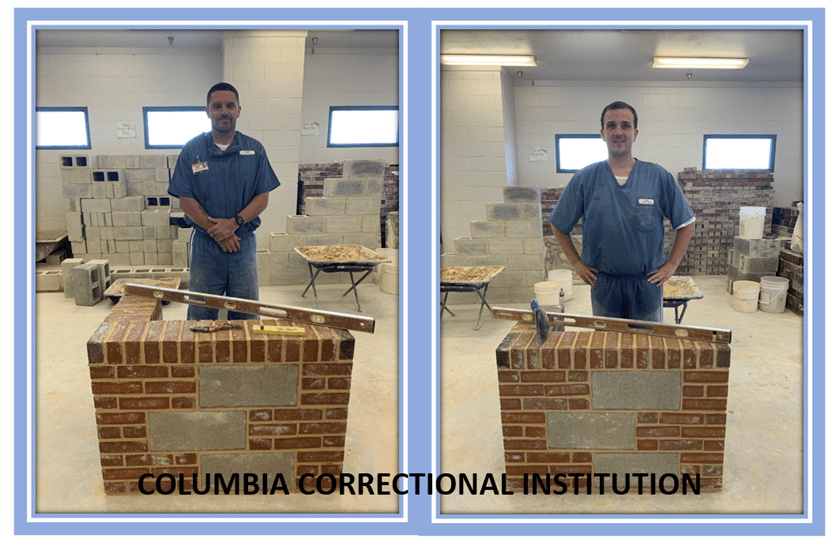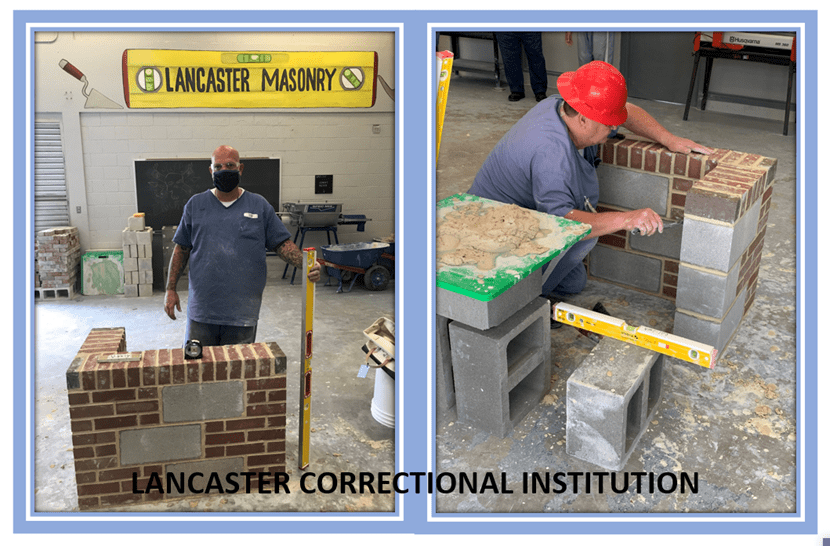Success in 2021: An Update on the Florida Department of Corrections’ Masonry CTE Program
Words: Cass Stern
Words: Cassandra Stern
Photos: FDOC
Editor’s Note: In April 2020, we spoke with Robert “Swede” Melgaard, Career & Technical Education Programs Administrator for the state of Florida’s corrections facilities. The previous article generated a significant buzz, and when the Florida Department of Corrections (FDOC) Masonry CTE Program successfully conducted a second inter-institutional masonry competition earlier this year despite the challenges posed by COVID-19, MASONRY Magazine reached out for an update. We spoke at length about the accommodations instructors have made to continue the FDOC Masonry CTE program, the challenges they have faced, and some surprising positive benefits from adapting to pandemic life. We want to sincerely thank Robert Melgaard and the FDOC for taking the time to speak with us and share photographs of this exciting event.
Cass Stern (MM): How have things been since we last spoke?
Robert Melgaard (FDOC): I have been doing well, super busy as always, even with the slowdown. The pandemic put us back a little bit by pausing our programs, specifically with career and technical education, in the hands-on component to training. It's hard to do virtual vocational-type training. We've had to adapt this last year, and we did a lot of correspondence packet work to keep students engaged with the bookwork part. As far as the hands-on, we were shut down for a little bit there. Now we're back wide open again and looking forward to going back to normal.
C.S.: What did you do to keep students engaged and connected while on lockdown?
R.M.: Our instructors worked right on through the old pandemic and the lockdown. They would prepare lessons, deliver individualized packets for the students, and send them to the dorms to do their coursework. Students would complete the work (kind of like homework packets) and send them back to the instructor, and the instructor would grade them. We were able to keep them semi-engaged through the process, at least occupy their time and keep their mind focused on the particular trade for their program. The only missing part was the hands-on part, which we couldn't do; obviously, you can't do that virtually or in the dorm setting. It was not ideal, but we made the best of the situation.
C.S.: Did you find that you had a decline in participants or enrollment because of the COVID shutdown, or were people still really engaged in the program and stayed with it?
R.M.: For the most part, they stayed engaged. We didn't do enrollments during the lockdown itself, just because it was hard enough to manage what we had on our plate to begin with. We just tried to manage the students that we had currently enrolled. But no, we didn’t lose very many at all. If anything, less than normal because you have a little bit of attrition through various things during normal operations. It's still a prison environment. But during the lockdown, it seemed like we could hold onto most of our students through the process.
C.S.: You recently had another successful competition!
R.M.: Yeah, so this was the Second Annual Inter-Institutional Masonry Competition. We had planned and had great success in the first year. We hoped to build on the momentum, make it bigger and better, and then COVID hit. We debated even having another competition; though, we needed to do it because of our success the first time around. We wanted to make sure we did it, if possible, in any way, shape, or form, so we came up with a modified version of the competition.
Last year we had everybody come together at one institution: all the different masonry programs we have scattered out sent a couple of participants over, and we did it in a one-day deal. This year, that wasn't an option because we couldn’t transport our students from institution to institution during the lockdown, so we did it as a separate contest.
We had the same judges traveling around the state for two weeks, and they would go in and observe the student participants. Each program still selected its two participants, and they were given the project to practice leading up to the contest. The judges came in from the Masonry Apprentice Education Foundation on the contest day, observed the contest, and then judged afterward. We kept the score sheets sealed until all the eight sides had been judged on different days and then went in and tabulated the scores to come up with some individual winners and the institutional winner.

C.S.: Can you tell me about the demographic breakdown of this year’s participants?
R.M.: We have eight active masonry programs, and each sent two participants. They were all adults 18 and up. I’m not sure about the cap and the range we have; some of them are up to their 50s. We did have one female institution that participated the same as last year, and it’s all local correctional institutions. They also provided a tender that kept their mortar on their boards and helped get their brick and block stacked up and ready during the project, then took care of them during the project itself. It was similar to how we did it before; we just did it eight individual times instead of doing it all in one day.
C.S.: Did you have strong local masonry industry support for this contest like you did for the previous year?
R.M.: Absolutely. The Masonry Association of Florida and the Florida Masonry Apprentice and Education Foundation coordinated the donation of all the materials and supplies for the contest. Each student could use brand new mortar and block on the contest day, and everything was given to them. So they practiced with the old stuff we had that we tore down and rebuilt over and over again. But for the contest day, they had more material to work with, and they showed well, and we took photos at the end. It really couldn’t go on without the support and the industry. It's so awesome to have that support. They backed us over the years and stepped up, especially the last couple of years, with these contests we've been trying to put on.
C.S.: Tell me a little bit about who won this year’s competition?
R.M.: Baker Correctional Institution, they won; they were the winners last year. Now they're back-to-back champions, but it was a super tight contest this year. I anticipated that it would be because each participant could work in their usual environment instead of moving up to one site where many people are watching in a big crowd, which is one advantage of doing it individually. I'm super impressed with the projects and how they turned out, and the scores reflect that.
I want to highlight the teachers, especially how they were able to adapt midstream and still provide the program participants with classwork from their cells and everything else. They deserve to be recognized, as do the program’s supporters and everyone who has donated their time, materials, or financial support.
I also want to highlight the judges because they took time out of their busy schedule to crisscross the state, back-to-back days from the panhandle down to Central Florida. Back and forth across coast to coast just out of goodwill and because they also want to see a successful contest. Without them, this wouldn't have been possible at all.
C.S.: Are you still providing career counseling, supporting resume building, helping with interviewing skills, and providing additional resources?

R.M.: We're still doing the soft skills we embed into our program, resume writing and mock interviewing. We still have contact with the employers and the industry folks, or they can come in. One thing we have adapted to during this time is we have increased our use of technology. Now we have Zoom monitors at some of our institutions to do pre-release interviews virtually instead of on-site. We are opening back up, and the employers and the interested folks are coming back in, and we also can interview pre-release with the use of technology virtually.
Some of our students may be at an institution in North Florida, but they're released to go home in South Florida. Zoom gives the employer the ability to connect with them pre-release, get to know them a little bit, and perhaps offer them a job where they're going home. Our goal with our programs is that we prefer to train, and we want to see all of them have a job pre-release, but that is the end goal; to have the opportunity to leave one day and start work the next when you return home.
C.S.: What would you consider to be the program’s greatest success over the last year?
R.M.: I think the partnership and the investment from industry into our programs and how we continue to build that relationship as it gets stronger and stronger. Going back years ago, we rarely even had industry coming into the programs and witnessing our training firsthand. Now you have them coming in regularly for open house events. They're doing pre-release interviews and job offers, donating materials and supplies, coming in, and doing guest lecturing. The way we've been able to harvest and build the relationship together is just amazing.
C.S.: We touched on this last time, but I want to include it in the update. What do you guys need? Do you still feel that you need the same things to continue to expand and succeed?
R.M.: We're still struggling to find qualified instructors, and that's our number one challenge, recruiting and retaining qualified teachers. I think just raising the awareness of what we're doing helps. Anytime there's been something written about it, or social media posts or a story about a competition that we're doing, it just raises awareness. That increases the ability for us to recruit. We have the same challenge as anyone else; when the economy's doing well, there's a lot of money to be made in the field. It takes a special person to want to come in and teach and provide the training for our returning citizens.

C.S.: What are the qualifications if someone's interested in applying to be an instructor?
R.M.: You have to have six years of journeyman experience in the trade or occupation field that we're training in. Once you are on board with us, we provide training; our curriculum providers within the construction trades use NCCER. Other than that, it's not that difficult. It is a full-time position to work in the state of Florida. Oh, good benefits and pay. Monday through Friday, Pretty much eight to five, seven to four, depending on the institution, 40 hours a week, full time. I mean, it's year-round. We don't have the summers off like the school districts do if you're teaching at, say, a high school or technical college.
C.S.: If other states were looking to your program as an example of starting their own, what advice would you give them?
R.M.: I would say, lean on your instructors. They came out of the field, they’re industry, and they have a lot of connections. Start small. If you have a statewide industry association (like the Masonry Association of Florida, for instance), reach out to them. They can provide guidance and make the networking a little bit easier, especially if you reach out to their contractors and their employers are willing to come in and support a program. Make the one call, have one contractor come in and speak to your class, and let it snowball from there. That's how we did it here; it evolved into what it is today. It was a work in progress and a lot of work, going back many years to get it to where we are now.
C.S.: Do you feel that the covid 19 pandemic has permanently changed how you conduct the program?
R.M.: We have already planned for next year's contest. We’re going to do it the second week of February, going back fully to normal. There has been some positive come out of the pandemic and the shutdown as far as the program and the training. We've increased our use of technology and the ability to connect virtually with our Regional Coordinator and our instructors on a real-time basis. We have an annual training with all of our instructors, but in the meantime, we're going to do our quarterly meetings virtually. We had to make some purchases, and we had to upgrade our technology in our classrooms to facilitate that. Going forward, that will be a plus for us to have even better communication from leadership down to the instructors in the actual classroom.
C.S.: Do you have any expansion plans in 2022?
R.M.: Absolutely. We've been tasked with managing across the board, not just for our masonry programs but for all career technical education programs. In the Florida Department of Corrections, masonry is on the board, and we'll have a couple more come online this year. Then we're going to increase programs to go up to as many as we can and begin to find instructors to fill those positions and build the programs. That's a pretty good time in current technical education, and we've received some additional funding to make these expansion efforts possible. The number one challenge is that we could set up all the programs in the world, but if you can't find a qualified instructor to teach it, then you're just going to be sitting there, holding the ball.
C.S.: Anything else you would like to add?
R.M.: When the previous article ran, I received some inquiries from other states’ corrections about how we did the contest. They asked questions like ‘What should they do if they wanted to start a masonry program or build to the contest level going forward?’ So there was the awareness and the promotion, which helped a lot. At the end of August, I will do a presentation at the correctional education Association Conference in Austin, Texas, about industry connections through competitions. We're doing our part and trying to promote it. And I appreciate what you're doing for us as well.
Update Addendum: This interview took place in summer 2021, and in late August, Robert reached out to let us know that he would be speaking in Austin as planned. We followed up with a few quick questions to see how it went!